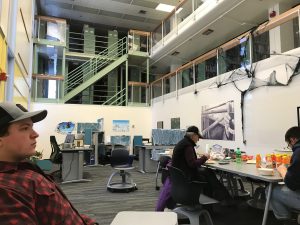- “People don’t just see you as a student, they see you as a contributor.” - December 6, 2017
by Jimin Kim on December 7, 2017
To those unfamiliar, scientific research can be seen as something specially reserved for professors with doctorates and the graduate students trying their best to earn one. But what should be known is that multiple times every year, thousands of undergraduates flock from around the world at scientific conferences where they present their research findings to professors, graduate students, and other undergraduates. This hidden world is unknown to most and students eager to join can be discouraged by the amount of work and lack of help, but at the University of Alaska Fairbanks, the Biomedical Learning and Student Training program is trying their best to answer questions and support undergraduate research.
KaCee Llewelyn, a senior and Biological Sciences major, about her preconceived notions about research: “I didn’t want to do it at all. I was going to do it to enhance my medical school application but when I got the scholarship and they said I could do any research I wanted, that’s when it became exciting.’ If medical applications were still the main reason for her doing research, she stated:
“It’s still definitely the major reason but it’s different in the way I view it… Now doors are open, you go to conferences and people don’t just see you as a student, they see you as a contributor.’
Llewelyn is currently reviewing literature and creating a survey for students that will participate in her research project, where she’ll design a novel human skeleton model that incorporates muscles and tendons. “Hopefully, this design I am creating will result in a new teaching model for students like myself that want to go to medical school and need a more comprehensive understanding of how the bones and muscles work together.’ Her plan is to attend an anatomy and physiology conference in California where she can present data from her self-led study with help from her mentor, Dr. Vaughn Seed.
If lab hours are an application of the knowledge learnt in class then research is the next step: an application of both class and lab knowledge to real problems and questions in the world. Noah Khalsa, a freshmen and Marine Fisheries major, on research in academics:
“I mainly did it because I see research as an integral part of your education. It’s kind of like an additional thing to do besides classes to get experience in your field.’
Khalsa is currently studying the effects of climate change on calcifying organisms such as corals and crustaceans. He is using a technique called Western blotting to do so, a subject introduced in classes but something Khalsa has familiarized himself with in his research. Agreeing with Khalsa, Llewelyn stated: “When I was told to read research articles in class, it was the most intimidating thing in the world but now that I’ve written one and understand it, it almost makes my education that much better.’
The Biomedical Learning and Student Training program employs a mentor-mentee relationship system, pairing each student to a Laboratory Research and Teaching Technician to guide each student into research and to provide a source of answers for their questions.
Graduates show undergraduates how labs are run, said Jennifer Lu, the program’s office manager. “When they go off to research in medical school, now they have that experience. It’s all new for students, it helps to have someone to guide you.’ The value of that mentoring relationship forged with undergraduate researchers extends beyond academics, she said. “They’ll help you with your classes, your personal life, anything.’
SCHOLARSHIP INFO:
The Biomedical Learning and Student Training program offers two levels of scholarships. The Undergraduate Research Experience award is worth up to $2500 per semester for research supplies, travel, and student salary. Even more generous, the full scholarship, of which there are about 30, covers all tuition costs, and a monthly stipend ranging from $734 to
$1028 per month, plus additional expenses covering related research and travel costs.
The application for the spring semester Undergraduate Research Experience recently closed but the 2018-2019 Biomedical Learning and Student Training scholarship application is set to open Dec. 11.

Khalsa and others gather for a social event in the BLaST Student Engagement Center, Arctic Health Research Building room 185.
